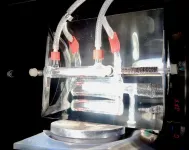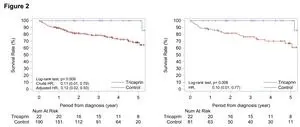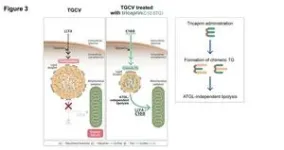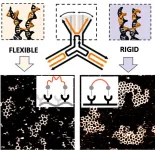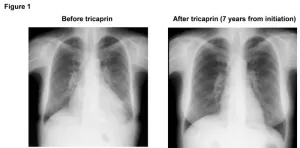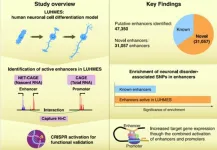(Press-News.org) Researchers have developed a reactor that pulls carbon dioxide directly from the air and converts it into sustainable fuel, using sunlight as the power source.
The researchers, from the University of Cambridge, say their solar-powered reactor could be used to make fuel to power cars and planes, or the many chemicals and pharmaceuticals products we rely on. It could also be used to generate fuel in remote or off-grid locations.
Unlike most carbon capture technologies, the reactor developed by the Cambridge researchers does not require fossil-fuel-based power, or the transport and storage of carbon dioxide, but instead converts atmospheric CO2 into something useful using sunlight. The results are reported in the journal Nature Energy.
Carbon Capture and Storage (CCS) has been touted as a possible solution to the climate crisis, and has recently received £22bn in funding from the UK government. However, CCS is energy-intensive and there are concerns about the long-term safety of storing pressurised CO2 deep underground, although safety studies are currently being carried out.
“Aside from the expense and the energy intensity, CCS provides an excuse to carry on burning fossil fuels, which is what caused the climate crisis in the first place,” said Professor Erwin Reisner, who led the research. “CCS is also a non-circular process, since the pressurised CO2 is, at best, stored underground indefinitely, where it’s of no use to anyone.”
“What if instead of pumping the carbon dioxide underground, we made something useful from it?” said first author Dr Sayan Kar from Cambridge’s Yusuf Hamied Department of Chemistry. “CO2 is a harmful greenhouse gas, but it can also be turned into useful chemicals without contributing to global warming.”
The focus of Reisner’s research group is the development of devices that convert waste, water and air into practical fuels and chemicals. These devices take their inspiration from photosynthesis: the process by which plants convert sunlight into food. The devices don’t use any outside power: no cables, no batteries – all they need is the power of the sun.
The team’s newest system takes CO2 directly from the air and converts it into syngas: a key intermediate in the production of many chemicals and pharmaceuticals. The researchers say their approach, which does not require any transportation or storage, is much easier to scale up than earlier solar-powered devices.
The device, a solar-powered flow reactor, uses specialised filters to grab CO2 from the air at night, like how a sponge soaks up water. When the sun comes out, the sunlight heats up the captured CO2, absorbing infrared radiation and a semiconductor powder absorbs the ultraviolet radiation to start a chemical reaction that converts the captured CO2 into solar syngas. A mirror on the reactor concentrates the sunlight, making the process more efficient.
The researchers are currently working on converting the solar syngas into liquid fuels, which could be used to power cars, planes and more – without adding more CO2 to the atmosphere.
“If we made these devices at scale, they could solve two problems at once: removing CO2 from the atmosphere and creating a clean alternative to fossil fuels,” said Kar. “CO2 is seen as a harmful waste product, but it is also an opportunity.”
The researchers say that a particularly promising opportunity is in the chemical and pharmaceutical sector, where syngas can be converted into many of the products we rely on every day, without contributing to climate change. They are building a larger scale version of the reactor and hope to begin tests in the spring.
If scaled up, the researchers say their reactor could be used in a decentralised way, so that individuals could theoretically generate their own fuel, which would be useful in remote or off-grid locations.
“Instead of continuing to dig up and burn fossil fuels to produce the products we have come to rely on, we can get all the CO2 we need directly from the air and reuse it,” said Reisner. “We can build a circular, sustainable economy – if we have the political will to do it.”
The technology is being commercialised with the support of Cambridge Enterprise, the University’s commercialisation arm. The research was supported in part by UK Research and Innovation (UKRI), the European Research Council, the Royal Academy of Engineering, and the Cambridge Trust. Erwin Reisner is a Fellow of St John’s College, Cambridge.
END
Solar-powered device captures carbon dioxide from air to make sustainable fuel
2025-02-13
ELSE PRESS RELEASES FROM THIS DATE:
Bacteria evolved to help neighboring cells after death, new research reveals
2025-02-13
Darwin’s theory of natural selection provides an explanation for why organisms develop traits that help them survive and reproduce.
Because of this, death is often seen as a failure rather than a process shaped by evolution.
When organisms die, their molecules need to be broken down for reuse by other living things.
Such recycling of nutrients is necessary for new life to grow.
Now a study led by Professor Martin Cann of ...
Lack of discussion drives traditional gender roles in parenthood
2025-02-13
Conversations about parental duties continue to be led by mothers, even if both parents earn the same amount of money, finds a new study by a UCL researcher.
A new study by Dr Clare Stovell (IOE, UCL’s Faculty of Education & Society), published in the Journal of Family Studies, highlights how a lack of discussion between parents about important choices such as parental leave, work and childcare is perpetuating traditional gender roles.
The study found that women usually lead the conversations and there is little discussion about the man’s work schedule, even in cases where the woman earns as much or more than her partner.
Dr Stovell said: “These interviews ...
Scientists discover mechanism driving molecular network formation
2025-02-13
Covalent bonding is a widely understood phenomenon that joins the atoms of a molecule by a shared electron pair. But in nature, patterns of molecules can also be connected through weaker, more dynamic forces that give rise to supramolecular networks. These can self-assemble from an initial molecular cluster, or crystal, and grow into large, stable architectures.
Supramolecular networks are essential for maintaining the structure and function of biological systems. For example, to ‘eat’, cells rely ...
Comprehensive global study shows pesticides are major contributor to biodiversity crisis
2025-02-13
Pesticides are causing overwhelming negative effects on hundreds of species of microbes, fungi, plants, insects, fish, birds and mammals that they are not intended to harm – and globally their use is a major contributor to the biodiversity crisis.
That is the finding of the first study assessing the impacts of pesticides across all types of species in land and water habitats, carried out by an international research team that included the UK Centre for Ecology & Hydrology (UKCEH) and the University of Sussex.
Multiple negative impacts
The scientists analysed over 1,700 existing lab and field studies of the impacts of 471 different ...
A simple supplement improves survival in patients with a new type of heart disease
2025-02-13
Osaka, Japan – Heart transplant is a scary and serious surgery with high cost, but for patients with heart failure it can be the only option for cure. Now, however, a multi-institutional research team led by Osaka University has found that simply taking a supplement might be all that is needed for certain patients with heart failure to recover – no surgery needed.
In a study published in Nature Cardiovascular Research, the research team found that tricaprin, a natural supplement, can improve long-term survival and recovery from heart failure in patients with triglyceride deposit cardiomyovasculopathy ...
Uncovering novel transcriptional enhancers in neuronal development and neuropsychiatric disorders
2025-02-13
Neuropsychiatric disorders are becoming increasingly prevalent. Given their complex and multifactorial pathogenesis, there is an urgent need for effective and targeted therapies that can improve patients’ quality of life. Genome-wide association studies (GWASs) have identified various genetic alterations that contribute to the development and progression of neuropsychiatric disorders, ranging from mild dyslexia to more severe conditions such as schizophrenia.
While thousands of single nucleotide polymorphisms (SNPs)—changes in a single nucleotide position in the DNA—have been associated with neurological ...
IR Sant Pau study reveals immune system’s crucial role in ALS at cellular level
2025-02-13
A team of researchers from the Sant Pau Research Institute (IR Sant Pau) has published a study in the Journal of Neuroinflammation that, for the first time, examines in depth the role of the peripheral immune system in amyotrophic lateral sclerosis (ALS) at the single-cell level. Their findings suggest that immune system cells—particularly two subpopulations of Natural Killer (NK) cells—may play a crucial part in the development and progression of this neurodegenerative disease.
ALS is a condition that causes the progressive degeneration of motor neurones, leading to a loss of muscle function and, eventually, affecting ...
Brain rhythms can predict seizure risk of Alzheimer’s disease patients, study finds
2025-02-13
A UCLA Health research team has identified changes in brain rhythms that indicate seizure activity in Alzheimer’s patients.
The findings, published in Brain Communications, build on UCLA neurologist and senior author Dr. Keith Vossel’s pioneering work that first linked silent epileptic activity to cognitive decline in Alzheimer’s disease.
Vossel’s previous studies showed that silent seizures, detected through overnight electroencephalography (EEG) and one-hour magnetoencephalography (MEG), occur in more than 40% of Alzheimer’s patients—beyond the 20% who experience overt seizures. His research has demonstrated ...
Scientists develop innovative DNA hydrogels for sustained drug release
2025-02-13
Hydrogels are polymeric materials with three-dimensional network structures containing large amounts of water. They serve as sustained-release drug delivery systems as they can encapsulate various bioactive substances, including drugs, antigens, and even cells. Hydrogels are better drug delivery alternatives than conventional systems, as they are more biocompatible, biodegradable, and easily administered as an injectable scaffold.
DNA has gained significant attention as a promising hydrogel material thanks to its customizable physicochemical properties, leading to the development of various DNA ...
Paramedics facing challenging end-of-life care demands
2025-02-13
Paramedics in England are experiencing wide-ranging challenges in responding to the increasing number of end-of-life care patients they are being called out to, according to a study from the University of Southampton.
The study published in BMC Palliative Care highlights the issues paramedics face when responding to patients at end-of-life, including a lack of patient information, barriers to administering medication, and insufficient training.
It was funded by Marie Curie and supported by National Institute for Health and Care Research (NIHR) Applied ...
